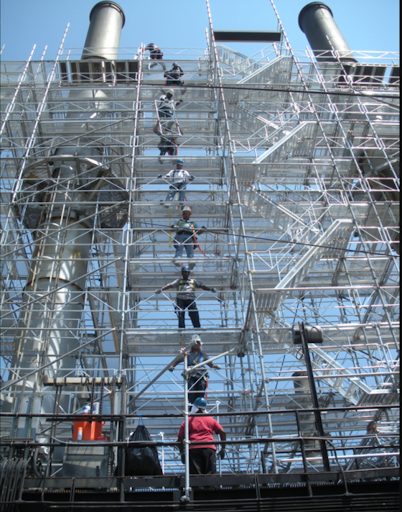Discovering the Different Kinds of Scaffolding Used in Building Jobs
The building market relies greatly on different types of scaffolding to meet specific task demands, each offering unique advantages and applications. Conventional framework scaffolding supplies a durable foundation for general tasks, while suspended scaffolding is essential for job on high-rise frameworks.

Typical Structure Scaffolding
Traditional frame scaffolding is just one of the most extensively made use of approaches in the building and construction market because of its robustness and versatility. This system consists of horizontal and vertical frames that are put together to create a stable platform for employees and materials. The main parts consist of vertical blog posts, straight journals, and diagonal braces, which together provide a strong structure that can support substantial tons.
One of the key benefits of traditional framework scaffolding is its adaptability to different construction jobs, ranging from property buildings to huge commercial structures. The modular layout enables simple setting up and disassembly, making it efficient for both long-lasting and short-term projects. Furthermore, the system can be customized in height and size, accommodating various building layouts and site conditions.
Safety is paramount in scaffolding applications, and standard structure systems are geared up with guardrails and toe boards to avoid drops and ensure worker security. Routine assessments and adherence to safety and security laws are essential in preserving the stability of the scaffold (Scaffolding). On the whole, traditional frame scaffolding remains an essential option in the building market, supplying a reliable platform for labor and improving total task performance

Suspended Scaffolding
Put on hold scaffolding supplies a special option for construction projects that call for access to elevated surface areas, especially in circumstances where traditional structure scaffolding might be impractical. This sort of scaffolding is normally put on hold from the roofing system or top levels of a framework, using a system of ropes, platforms, and wheels to develop a working area that can be adapted to different elevations.
One of the main benefits of suspended scaffolding is its versatility. It can be conveniently repositioned or decreased to fit changes in building demands, making it suitable for tasks such as home window installation, façade job, and maintenance on skyscrapers. Additionally, the very little impact of put on hold scaffolding permits much better use ground space in urban atmospheres, where room is typically minimal.
Safety is an essential factor to consider in the usage of put on hold scaffolding. On the whole, put on hold scaffolding offers a reliable and reliable option for accessing hard-to-reach areas in various construction scenarios, boosting both performance and security on site.
System Scaffolding
System scaffolding, typically considered a contemporary service in the scaffolding industry, contains pre-engineered elements that can be rapidly put together and adapted for numerous building and construction jobs. Scaffolding. This kind of scaffolding is defined by its modular design, which allows for convenience and efficiency on work websites, fitting architectural demands and different elevations
Usually made from high-strength steel or aluminum, system scaffolding offers boosted longevity and security. The elements consist of upright articles, horizontal ledgers, and diagonal braces, which adjoin securely, guaranteeing a robust structure. The design often includes standardized installations, simplifying assembly and disassembly processes, consequently minimizing labor time and costs.

Rolling Scaffolding
Moving scaffolding is a functional you could try these out choice to typical set scaffolding, created for wheelchair and convenience of usage on building sites. This type of scaffolding includes a platform sustained by frames with wheels, allowing workers to easily relocate it as needed. The wheelchair feature significantly enhances efficiency, as it decreases downtime related to dismantling and setting up taken care of scaffolding.
Normally built from lightweight products such as aluminum or steel, rolling scaffolding offers a tough yet portable remedy for jobs requiring constant repositioning - Scaffolding. It is particularly useful my blog in tasks such as paint, drywall setup, and electric work, where accessibility to different heights and areas is needed
Security is paramount in rolling scaffolding layout, with functions such as locking wheels to avoid unexpected motion when in operation, and guardrails to secure employees from drops. Furthermore, many models are adjustable in elevation, suiting numerous task demands.
Cantilever Scaffolding

The layout of cantilever scaffolding generally involves utilizing arms or brackets secured to a structure or framework, making it possible for the system to expand outside securely. Safety is critical; therefore, these scaffolds should be crafted to endure various lots and ecological problems. Routine inspection and upkeep are necessary to make sure structural stability and worker safety and security.
Cantilever scaffolding is preferred for its flexibility and reliable use of space, making it a preferred option in city atmospheres where room restrictions prevail. In addition, it promotes much easier access to high altitudes, ultimately adding to the overall performance of building and construction tasks. Just like all scaffolding kinds, appropriate training and adherence to safety and security criteria are vital for employees utilizing cantilever scaffolding.
Verdict
To conclude, the varied kinds of scaffolding utilized in building and construction tasks each serve unique objectives tailored to particular site needs. Typical framework scaffolding supplies security, while suspended scaffolding supplies versatility for elevated tasks. System scaffolding promotes fast setting up, and rolling scaffolding boosts mobility for varying workplace. Cantilever scaffolding properly deals with challenges in metropolitan setups. Recognizing these scaffolding kinds is important for enhancing safety and security and my sources performance in construction, ultimately adding to the successful conclusion of jobs.
Conventional framework scaffolding gives a strong structure for basic tasks, while suspended scaffolding is crucial for job on skyscraper frameworks.Moving scaffolding is a functional option to standard fixed scaffolding, designed for mobility and convenience of usage on building sites. As with all scaffolding kinds, correct training and adherence to security standards are critical for employees using cantilever scaffolding.
Conventional frame scaffolding provides security, while suspended scaffolding offers convenience for raised tasks. System scaffolding promotes quick assembly, and rolling scaffolding boosts wheelchair for varying work settings.